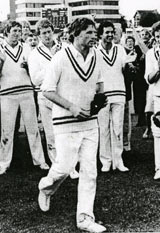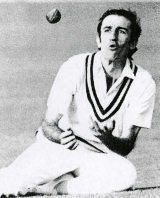Zimbabwe stun feeble Australians
John Ward reports on Zimbabwe's historic World Cup victory over Australia in June 1983
Scorecard
|
|

|
Naturally the Zimbabwean players felt extremely nervous going into this match. Their team contained a number of experienced players of genuine international standard but, apart from John Traicos who had played for South Africa in three Tests against Australia in 1969/70, nobody had played at that level before. They were chiefly apprehensive about facing the renowned Australian pace attack of Dennis Lillee, Jeff Thomson (although both were by now past their best), Geoff Lawson and Rod Hogg. Only Ken MacLeay of the Young Australian team which had recently toured Zimbabwe was selected in the Australian party, and he was not playing in this match, so they had never met any of the opposition on the field before, although they had seen them in action on television or video. On the other hand, they knew that they were the underdogs and nobody expected them to win, so there was no pressure on them from that point of view.
The unusual feature about the Australian batting line-up was that it contained six left-handers -- Wood, Wessels, Hookes, Yallop, Border and Marsh -- in the first seven, captain Kim Hughes being the only exception. There was a lot of discussion about that, and it was felt that Vince Hogg and John Traicos would have an advantage as both would tend to move the ball away from the left-handers, Hogg swinging the ball in the air and Traicos spinning it off the pitch. Jack Heron had played against several of the Australians in league cricket in England over the last few years, so he was best equipped to give the others some inside information on the players.
Vince Hogg remembers that there was a lot of confusion between himself and his namesake Rodney Hogg of Australia, and he received numerous phone calls at the hotel that were intended for the Australian.
Zimbabwe were also plunged in at the deep end in another way, by having as their first venue the historic Nottingham Test ground of Trent Bridge, rather than the more homely county grounds on which they were to play their next four matches. The ground itself did not awe them, though, so much as the occasion and the opposition. With the Zimbabwe team being little known in England, the crowd was not big enough to intimidate or inspire them.
They were greatly encouraged by the South African Clive Rice, who was at that time captain of Nottinghamshire. He was very supportive and sat in the changing rooms with them, giving them all the advice he could about the pitch and the opposition.
It was a warm sunny day as Australia put Zimbabwe in to bat on winning the toss, which probably worked to the Zimbabweans' advantage, as their fears were mainly about the Australian bowlers and would probably have struggled to chase any target the opposition might have set. At the time, though, most of the Zimbabwe players would probably have preferred to field first, to give them a better chance of feeling their way in and adjusting to the new situation.
The pressure was strongest on Ali Shah and Grant Paterson as they went out to open the innings, but they handled it superbly. Paterson took first strike against Lawson, and was immediately under way with a glance to fine leg for a single. Later in the same over Shah opened his account with another single for a hook to fine leg.
Lillee and Thomson, now towards the end of their careers, had not opened the bowling, the new ball being entrusted to Lawson and Hogg, who were now the quicker bowlers, especially Hogg. When Lillee came on, he soon had a minor altercation with Paterson. The batsman hooked a ball to fine leg and started running, watching the ball as he did so. Lillee, never a man to give way, remained firmly rooted in his follow-through and Paterson accidentally brushed his elbow as he passed him. Lillee, with characteristic graciousness, advised Paterson that if he did that again he would break his arm. Paterson did accidentally brush him again not long afterwards, and this time responded to Lillee's sweet talk by telling him to 'wind his neck in'. He received some short-pitched balls after that, but at the age of almost 34 Lillee was no longer quick enough to intimidate by pace alone. According to Robin Brown, the Zimbabweans had to face quite a few 'verbals', but they handled them well.
Overall the Zimbabweans had no real problems with Lillee's bowling, as neither he nor Thomson bowled at the pace they expected; Lillee was actually rather erratic early on. The pitch had given a little help to the bowlers to start with, but the Australians hadn't really used it to full effect, being too inaccurate. Thomson's first ball was at a great pace well down the leg side and beat everybody, including the wicket-keeper, to go for four wides.
Both openers, however, fell to Lillee with successive balls. Ali Shah remembers that he had tried to square-cut the pace bowlers but the stroke was constantly blocked by the fielder at point. He had been trying too hard to reach the boundary instead of looking for the single and was feeling frustrated. Trying to cut the ball finer and find the gap, he hit it too fine and Marsh dived in front of first slip to take the catch. Next ball Paterson tried to hit the ball over the field and was caught in the covers, and Zimbabwe had to rebuild. Andy Pycroft successfully survived the hat-trick ball. It was, though, a remarkable effort by the two young openers to have shared a fifty partnership together first time out against such renowned opposition.
Heron and Pycroft restored the situation somewhat before Heron was caught behind off change bowler Graham Yallop, and then Dave Houghton was immediately and controversially given out caught at the wicket. Houghton admits he clearly snicked the ball, which was taken by wicket-keeper Rod Marsh, immediately flicked into the air in celebration, but dropped as it came down again. Houghton stood his ground, to be given not out by the umpire at the bowler's end. The Australians were unable to accept this, and they turned to the square leg umpire, who raised his finger, although he had not apparently been consulted by his colleague.
Pycroft fell the ball before lunch, bowled by a ball from Allan Border which pitched outside leg stump and turned unexpectedly. He remembers Duncan Fletcher, next man in, coming to him during the lunch interval and asking him, "What's it like out there?" Fletcher had played more cricket than anyone else in the side except Traicos, but he had never played at this level and was clearly 'unbelievably nervous'. After the interval he escaped with an early life before he settled in.
Kevin Curran shared a valuable partnership of 70 in 15 overs with Fletcher before he was also given out in what may have been another dubious decision; he was convinced, as were the other Zimbabweans, that David Hookes in the gully had successfully claimed a catch for a ball he had taken on the bounce. Curran still wasn't prepared to walk even when given out, and Fletcher had to prevail on him quietly to leave the crease.
This brought in Iain Butchart, and he and Fletcher proceeded to dominate the Australian attack, hitting it to all corners of the ground in an unbroken partnership of 75 in 13 overs. Butchart admits to being 'absolutely petrified' on his arrival in the middle, with Hogg and Lawson bowling again, but Fletcher steadied him by telling him quietly simply to stick in there and he would be all right; his job was just to stay there so they could get as many runs as they could. And so it proved.
Butchart was edgy to start with, getting away with some early snicks and taking a lot of verbal abuse from Hogg in particular. He played mainly a supporting role and does not consider it would have been a good one-day innings in today's context. He did play one particularly remarkable stroke, hitting Thomson over his head to the sightscreen.
From a precarious position at 94 for five, the team recovered to 239 for six, which they considered to be competitive; in Pycroft's words, "We thought we were in with half a chance if we managed to peg them down." The Australians had dropped about five catches during the course of the innings. The partnership between Fletcher and Butchart is still a World Cup record.
Graeme Wood, and even more particularly Kepler Wessels, who opened for Australia, began very slowly, which meant that the required run rate steadily rose. At the start of the innings the Zimbabwean aim was simply to bowl as tightly as possible and give nothing away. When Fletcher eventually dismissed Wood after an opening partnership of 61, to a fine catch at the wicket by Houghton, and Kim Hughes fell immediately, the Zimbabweans dared to believe that they were back into the game, especially as the required rate was now over five runs an over. Hughes flicked his first ball uppishly backward of the square-leg umpire, only to be well caught low down by Shah diving forward.
|
|

|
This put the Australians under a little extra pressure, especially as Wessels was finding it particularly difficult to keep the runs coming. This perhaps caused his eventual run out. Allan Border played a ball from Rawson to Heron at point, who saw Wessels at the non-striker's end backing up, so he shied at the stumps, to hit them with Wessels only just in his crease. However the quality of this piece of fielding reminded the batsmen not to take any chances with the Zimbabwean fielders. In the same over Border hit the ball again just wide of Heron and called for a run. Wessels, remembering who was fielding, hesitated, but with Border committed he had to run. Heron swivelled and, with only one stump to aim at, threw down the stumps at the striker's end with Wessels still well short of the crease. This was probably the turning point. On the other hand, Wessels had being doing a job holding an end up to make it possible for his partners to play their strokes -- only none of them were actually able to do so to great effect.
Dave Houghton also remembers the dismissal of Yallop as important. They had been told he was a player who liked to flick off his legs, but tended to do so uppishly. The Zimbabweans placed Pycroft on the boundary in preparation; Pycroft had perhaps moved in a little too far, and ended up taking a superb one-handed catch reaching high above his head. This came not long after Traicos had taken a superb catch in the covers to dismiss David Hookes.
Andy Pycroft rates this as one of the best fielding sessions he had ever seen from a Zimbabwean team, and he himself was to take two brilliant catches in the deep, the second on the very edge of the boundary to dismiss Border from a stroke that looked likely to carry for six. He pays tribute to the magnificent bowling of Traicos, who did not take a wicket but conceded only 27 runs in his 12 overs. He beat the left-handers ball after ball; Pycroft remembers him beating Hookes for four or five deliveries in a row during one over.
After Border and Lawson fell in quick succession to leave the score on 176 for seven, it was finally clear that, barring a remarkable turn-around, Zimbabwe would win the match. Marsh was still there, and he was the only Australian batsman successfully to attack the Zimbabwean bowlers, fighting like a tiger to win the match for his team, but the cause was now lost.
Right up until the last over, though, the Zimbabweans still didn't grasp the fact that they were heading for victory. Rawson was entrusted with the last over, which he bowled very well, despite a gigantic six by Marsh. He pitched the ball right up in the blockhole and was otherwise very hard to score from.
Fletcher was clearly the Man of the Match, with an unprecedented double of 69 not out and four wickets on his one-day international debut. Traicos had bowled even better without luck.
There was a crowd of perhaps between five and ten thousand, containing quite a number of Zimbabweans who had either emigrated or were over to follow their team. There were only about twenty or thirty of them, but they were waving the Zimbabwean flag and giving constant vocal encouragement to their team. One of them apparently made a small fortune by gambling 100 pounds on a Zimbabwean victory at odds of about 200-1, and he treated the team royally in the bar afterwards. There was also much support from local Englishmen, many of them from the Birmingham area who had befriended them the previous year, but the most vocal contributions came from the Australian camp followers.
Shah remembers chatting to some people after the game, and in response to a question said that if the team played as well as this in the next match they would have a good chance of beating India. He was unaware that they were reporters, and this came out in the press the next day that Zimbabwe were confident of giving India a hiding! The unfortunate Shah found himself fined, as the team were not allowed to talk to reporters.
Despite the surprise of the Australian defeat, there were no serious problems or incidents between the teams on the field and the match was played in good spirit throughout. There were few Australians who came into the Zimbabwean changing rooms afterwards, though, to shake hands and congratulate them on their victory. Pycroft remembers that Hughes as captain did so, as did Lillee and Wessels, the latter known to many of the Zimbabweans from the time when they played against him in the South African Currie Cup. Wessels the Zimbabweans appreciated as a person too; he was reserved but pleasant, and easy to talk to. Vince Hogg and Iain Butchart think Graeme Wood and Allan Border also came in after the match. The rest, who struck the Zimbabweans as being arrogant at the best of times, appeared to be most embarrassed and left the ground immediately. As for the Zimbabweans and their supporters, celebrations carried on throughout the night.
The opinion of the Zimbabweans was that there was clearly in-fighting in the Australian camp -- in fact, it consisted virtually of three camps. There was the Packer contingent, those who had been the mainstays of Kerry Packer's World Series cricket, centred around Lillee, Thomson and Marsh. There was Hughes with a few of his supporters, and there was a type of neutral party in the middle which included Allan Border. When Houghton spoke with some of the Australians in the hotel that evening, he found members of the different factions reviling each other with gusto. The Zimbabweans felt that this was a major reason why such a talented team did so badly in that World Cup, although Rod Marsh disagrees.
Dave Ellman-Brown also feels that Hughes was a weak captain who was unable to keep control of his team, especially his bowlers. Although Lawson appeared to give no problems, Hogg appeared to be out of control, while Lillee and Thomson resented the captain. He saw a division between the 'hierarchy' and the juniors, under a captain unable to keep control and a manager who he believes was the wrong manager, the president of the board, who was also unable to control that tearaway bunch of players.
There have been suggestions that the Australians lost the match because they were grossly overconfident, but Marsh again does not accept this. His position is that the Australians were aware that anything could happen in one-day cricket and that they were well prepared for the match; the Zimbabweans just played the better cricket.

